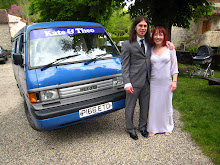On the Bristol PGCE course many demands are made of us as trainee English teachers. We have to have a wide-ranging knowledge and understanding of the literary canon (and alternative canons). Our knowledge of English grammar and morphology must be sufficiently strong to teach English Language A level. We may be called upon to teach Media Studies and Drama classes, and so must be well grounded in both the theory and practice of those subjects. We need to keep up to date with the latest strategies, guidelines and statutory requirements issued by the Government, LEAs and exam boards. On top of all this, we have to understand how children learn to speak, read and write from a baby's earliest days through to adulthood. It's this last aspect that, as a parent to 21 month-old Rosie, I find most fascinating.
Most parents teach their children to speak more or less unconsciously: they talk to their child, and the child learns. Kate and I have of course made the conscious decision to teach Rosie to speak Spanish - neither of us are native speakers yet I speak to her in Spanish and we try to expose her to the language through books and a playgroup. So, having researched bilingualism, we were already slightly more aware of the processes by which children acquire language, but we are even more so now. I feel that as a parent I've got a huge advantage over my peers as I can see, day by day, the theory being put into practice as Rosie's vocabulary and syntax expands. As a parent it's amazing understanding (more or less) what is going on, and it'll be even more amazing once she starts to read (the alphabet: she already 'reads' images), to be able to understand how she is doing it and why she makes the mistakes she will inevitably make.
However, in other ways being a student teacher and also a parent are not so great. This week my lesson planning and marking workload suddenly exploded, so this weekend has been mostly spent in front of the computer writing lesson plans. Indeed I haven't left the house since I got back at 5pm on Friday. Poor Rosie has been at a loss as to why Daddy hasn't been able to take her to the park, as he usually does at weekends, or why he hasn't been keen to let her bang the keys on the laptop. For the first time on the PGCE (and sadly I suspect not the last) I've felt that being a teacher and a parent don't mix, as trying to do both simultaneously simply meant I did neither as well as I would like.
On the last point though I may well be wrong. One of the many essays (Teaching as assisted performance) I've read for my PGCE assignments concludes that in order to be better teachers, we must be more like parents. The authors (Tharp & Gallimore) make the point that the vast majority of parents are extremely successful teachers, instructing their children, usually unconsciously, in language, social skills, spatial awareness, movement and many other things. While acknowledging that behaving like a parent is rarely, if ever, possible within an educational system that crams 30 students into a single classroom, there is definitely something to be said for this approach.
So perhaps I should walk into my new Year 10 class on Wednesday wielding a couple of snooker balls stuffed inside a sock yelling "Who's your daddy now!?"
Maybe not.
Subscribe to:
Post Comments (Atom)




No comments:
Post a Comment